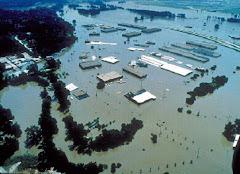Global Warming's Fever by Thomas Phelp
The earth has a fever." This was a statement from Nobel Prize winning documentarian, Al Gore.
Increasingly the view of mankind by mankind is that of intruder. In many ways it would seem that we are the earth's enemy and our very existence is depleting the earth of resources that could keep an environmental balance.
Global warming is the belief that the temperature of the air nearest to earth is consistently rising. Droughts are blamed on global warming and new products are constantly being developed to help lessen human impact on perceived climate change.
Electric or hybrid cars are thought to provide the best example of how we can reduce carbon emissions that are said to be harming the earth. Every day children are learning about global warming in school and some are even taking their parents to task for habits that may not be viewed as earth-friendly.
Chlorofluorocarbons (CFCs) were slowly eliminated when it was discovered that chlorine in this common chemical compound might be responsible for ozone depletion in the 1970s. That in turn caused many to believe the hole in the ozone was causing the earth to warm substantially. Obviously global warming sounds a clarion call to environmentalist, but politicians and the education establishment have also embraced it.
Research tends to support the idea that humans have less to do with climate change than livestock and other animals, yet this is rarely discussed in the global warming debate. You should know there are those that believe the theory of global warming may be less dramatic than the aforementioned fever.
For instance there is no hard scientific data to indicate a long-term warming trend. Where some would espouse the belief that oceans will rise dramatically as icebergs melt the actual short-term data indicates an air temperature increase of less than a degree.
Additionally there are those who would request data be collected from multiple climate environments to assess the actual temperature variances. This is something that has not been factored into the current Global warming theory.
In was noted in 2007 that efforts in the UK to reduce the impact of their human population on the environment did essentially nothing to actually help in the effort. For every action there is an equal and opposite reaction - we've all heard that before. The 'action' was regulation to effect a positive change in CO2 emissions. The 'reaction' was no change in spite of increased man-hours, new regulations and general compliance.
Would further restrictions stunt technological advances? There are those who believe global warming is much ado about nothing and remain alarmed that so many changes are being enacted based on a theory with no long-term supporting data. They are also alarmed that the regulations that are already in place are having very little impact on a perceived problem.
Add to that the fact that 2007 was the coldest year on record for the 21st century and you can see why some believe that the term 'fever' might have been used prematurely. Some may even wonder if man has less control over environmental change than we would like to believe.
I'm certainly not advocating that we act irresponsibly with our natural resources, but from a scientific point of view it is irresponsible to extrapolate an extremely costly plan of action from data that does not support the action.
From a logical point of view it makes perfect sense to replace deforested land with new plant life that can convert CO2 to oxygen. It makes sense from an economic point of view to decrease gas consumption as gas prices rise. From a health perspective it makes sense to reduce emissions to assist in the decrease of health issues. However, when the data doesn't support the theory it is either time to adopt a new theory or at the very least face the facts.


No comments:
Post a Comment